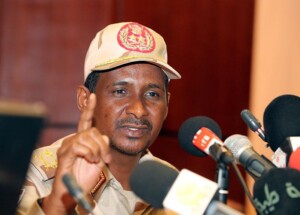‘Crisis cell’ convened to contain political tension in Sudan
At an emergency meeting yesterday, the Sudanese Council of Ministers decided on the formation of a seven-member committee headed by Prime Minister Abdallah Hamdok to discuss ways to contain the acute crisis between the ruling partners.
 Protests in Khartoum this week (Photo: SUNA)
Protests in Khartoum this week (Photo: SUNA)
At an emergency meeting yesterday, the Sudanese Council of Ministers decided on the formation of a seven-member committee headed by Prime Minister Abdallah Hamdok to discuss ways to contain the acute crisis between the ruling partners.
The Council of Ministers said in a press statement following the meeting that it had formed “a crisis cell” with members “from all parties to address the current crisis between the government partners, and fortify the civil democratic transformation”.
The committee’s seven members, including four members of the Sovereignty Council (two from the military component and two from the two factions of the Forces for Freedom and Change) has been given 48 hours to do its work.
The Council of Ministers stated its full keenness to address this current political crisis, and stressed the importance of dialogue between all parties to the current crisis. The Ministers further affirmed the importance of all parties refraining from escalation and counter-escalation.
During the meeting, the PM reported his continuous meetings during the past days with the political parties to the crisis, stressing the agreement to continue the dialogue between everyone despite all the differences.
“History will judge us by our success in bringing stability and democracy to our country and people,” Hamdok said and reiterated the importance of “addressing the core issues and avoiding personalising matters”.
Eastern Sudan
In its emergency meeting yesterday, the Cabinet also renewed the efforts made to address the issue of eastern Sudan, and to finding “just solutions that preserve the interests of our people in the east of the country”, as the roads and ports in Red Sea state remained closed for the 32nd day.
The Council discussed the ongoing contacts with the eastern Sudan protest leaders headed by Nazir Mohamed El Amin Tirik, and pointed to the need to continue these efforts “in a way that creates a positive and appropriate atmosphere to reach permanent solutions” for eastern Sudan.
The protestors emphasised the continuation of the closure of roads and ports until the Eastern Sudan Track protocol of the Juba Peace Agreement is cancelled.
The Governor of the El Gezira Agricultural Scheme, Omar Marzoug, said that the detention of fertilisers in the main port in Port Sudan threatens the winter season. He noted that fertilisers are important and must be distributed to farmers well in advance, and that their lack of access threatens and weakens the productivity of the current season of wheat.











 and then
and then